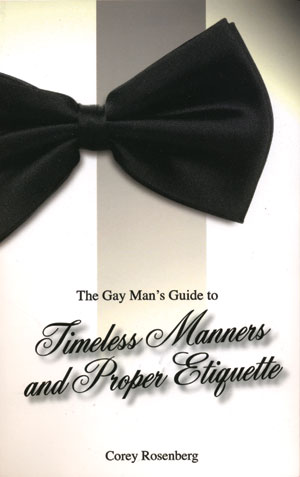The Gay Man’s Guide to Timeless Manners and Proper Etiquette, by Corey Rosenberg. (2011, Chelsea Station Editions) $15. 120 pp.
 Oscar Wilde, as usual, said it best: “A gentleman is one who never hurts anyone’s feelings unintentionally.”
Oscar Wilde, as usual, said it best: “A gentleman is one who never hurts anyone’s feelings unintentionally.”
Corey Rosenberg’s current-day homage to homosexual decorum, The Gay Man’s Guide to Timeless Manners and Proper Etiquette, deftly seizes upon Wilde’s Victorian-era kernel of truth and expands it into a post-modern banquet of American gay, fast-food sensibilities.
More pamphlet, unfortunately, than book, Rosenberg’s opus would have benefited greatly from decent editing: Wise amelioration would certainly have gone a long way toward persuading Rosenberg’s readers to trust his voice. When he refers to himself in the preface as, “the consummate host,” the reader is absolutely ready to follow him down the path of how to do the right and proper thing; sadly, when he goes on to own up nobly to some “shear [sic] and vile behavior,” the reader is caught flat-footed by poor editing.
Unacceptable typos aside — even in a book professing to divulge proper gay etiquette — Chapter 1’s title alone, “The truth about ‘pleases’ & thank you’s’” is too littered with grammatical heresies for any person (say nothing of whether they’re gay) interested in learning proper behavior to take cues from this puffery of sheer syntax laziness; that said, Rosenberg is spot-on regarding why one should never forget to say “please” or “thank you.”
How this common-sense wisdom applies to gay men exclusively is not elucidated upon, except the dismissive assertion that, “attitudes of entitlement are a commonality in the gay community.” Bullfeathers! This reviewer, as a card-carrying member of the club himself, has a very difficult time accepting the cliché of all gay men being self-centered prima donnas.
The book is a puzzling
parade of mixed-message brevity. Chapter 3’s full 110 words, entitled “The Gym,” rather preciously proclaim, “Please remember that the only person you are meant to compete with at the gym is yourself;” yet, Chapter 13’s subject, “Being Attired Properly and Appropriately,” states, “A respectable gay man never wears a skimpy Speedo unless his stomach is tight, his skin is a few shades darker than a wintry shade of pale and he is under the age of 50.” Which is it: Are gay men only complete with themselves when they’re young and physically attractive to others; or are they only complete with themselves once they’re too old to pass for under-50?
At worst, Rosenberg’s guide to gay propriety is an innocuous piece of fluff, like bellybutton lint illuminated by a reflected disco ball’s ray upon your trick’s glistening, shirtless torso.
Rosenberg does offer useful visuals on how to loop a genteel bow tie knot, even if he doesn’t tackle acknowledging the difference between modern life and yesteryear: As he attests in Chapter 18, “Social climbing is a sleazy act of using people to quickly achieve higher rank or status within the community. A proper young man knows the difference between innocent social networking and skipping lines and climbing ladders.”
Here’s to all “proper” young men, then — past, present and future.
— Howard Lewis Russell
This article appeared in the Dallas Voice print edition September 16, 2011.















